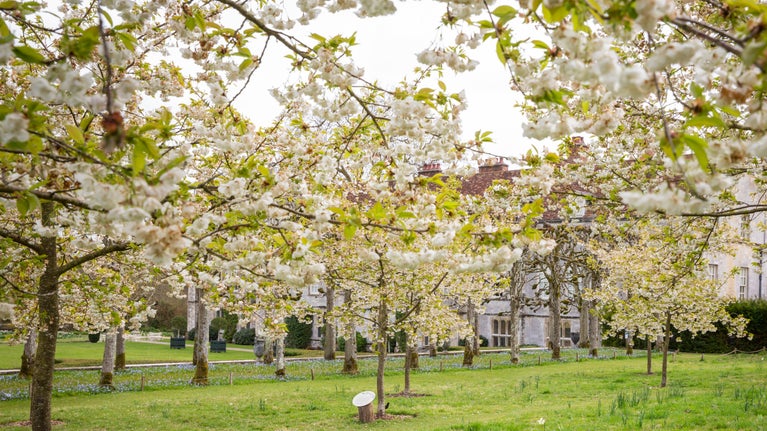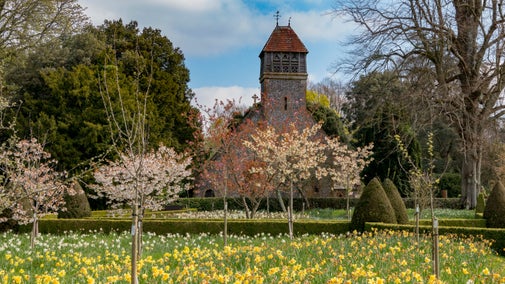
Discover more at Mottisfont
Find out when Mottisfont is open, how to get here, the things to see and do and more.

Discover a garden of ancient trees, babbling brooks and rolling lawns. Carpets of spring bulbs, walled gardens, a world-famous collection of once-flowering roses, rich autumn foliage and a colourful, scented winter garden create a feast for the senses all year round.
The abundant spring that gave Mottisfont its name is now an ornamental feature of the garden. Tributaries of the River Test flow through the grounds, too. Follow paths beside the waterways to spot trout basking and swans gliding.
As you approach the house, an enormous tree catches the eye – seeming to dwarf the building from some angles. This huge London plane is thought to be the largest of its kind in Britain, and forms part of the National Collection of plane trees which stand in the grounds.
The garden is home to many other fine specimen trees, including grand horse chestnuts and stately oaks, planted by Georgian owners. Twentieth-century features include an elegant double row of pollarded limes and a circle of beech trees.
Each spring, blossoms add a touch of colour to the gardens, reminding us that warmer weather is on the way. From our magnolia, which blooms by the entrance to the house, to the beautiful cherry orchard that transforms into delicate pink and white blossoms, there are plenty of places around the garden to enjoy their beauty.
Cherry Orchard
One of the best places to see blossoms is in the cherry orchard located behind the house near the lime walk. The Mount Fuji cherry trees start to blossom in March and are a great source of food for early pollinators like bees and insects. During March and April, the cherry orchard transforms into clouds of delicate pink blossoms.
Kitchen Garden
Another place to see blossoms is the Kitchen Garden, home to a heritage collection of apple trees, including species like Charles Ross, Newton Wonder, and Cornish Aromatic. Apple trees typically blossom later in the season, between late March and May, with each variety of apple having a slightly different shade of blossom.
Other areas to discover blossom
Blossom trees can also be found throughout the wider gardens, including a wild cherry on the North Paddock and another near the cherry orchard behind the house. As you explore, keep an eye out for blossom signs with information about our trees. In some areas of the garden, we are also encouraging mindful moments to help visitors pause and connect with nature.
The winter garden at Mottisfont was created to bring colour and scent into the gardens during a time of year that would tend to be quiet. The shape of the winter garden was inspired by the font stream and the paths meander to reflect the way the font stream flows through the landscape.
Our volunteer Garden Guides lead free themed daily walks, including a Welcome Walk which provides a general introduction for first-time visitors, alongside more in-depth history and seasonal garden walks. The Welcome Team at visitor reception will be able to advise what’s on offer when you visit.

Find out when Mottisfont is open, how to get here, the things to see and do and more.

We make compost in vast quantities at Mottisfont, keeping the soil healthy and ensuring the garden, including the famous rose collection, is looking its very best.

Mottisfont is a two pawprint rated place. Dogs on a short lead are welcome to explore most of the garden.

Explore Maud Russell’s 1930s neo-classical interiors, in an 18th-century house with medieval origins and enjoy changing art exhibitions in the spacious gallery.

Explore Mottisfont’s diverse estate, traversed by the crystal-clear River Test, and south Hampshire countryside sites of Stockbridge Down and Marsh and Curbridge Nature Reserve.

The National Collection of Pre-1900 Shrub Roses reaches its peak flowering season in early summer for a spectacular annual display.

From 18th-century water gardens and Arts and Crafts landscapes to intimate woodland gardens, there are so many places to discover.

Discover our gardeners’ top tips so you can make the most of your garden, plot or window box.

Hampshire has delightful gardens and parklands to explore in spring. Discover places with beautiful spring bulb displays, orchards of blossom and beautiful vistas to enjoy with family and friends.